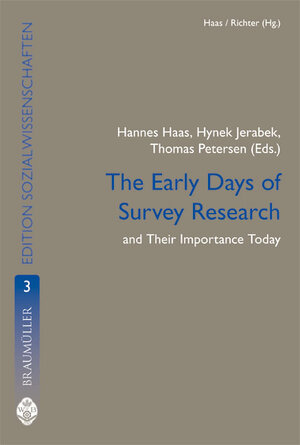
×
![Buchcover ISBN 9783700317937]()
The Early Days of Survey Research and Their Importance Today
herausgegeben von Hannes Haas, Hynek Jerabek und Thomas PetersenThis book is written for everyone who wants to take a look at public opinion research and the empirical social sciences from a different angle, everyone who is interested in its roots and believes it is important to learn from and build on the insights gained by the pioneers in the field. The idea for the book goes back to a conference held in 2010 at the University of Vienna, a conference that was organized jointly by the University of Vienna, the Charles University in Prague and the World Association for Public Opinion Research (WAPOR). It is not a conference publication in the classic sense, however, for along with a selection of papers presented at the conference, it also contains a number of articles written especially for this book. The book focuses not only on simply describing the history of research in the field, but also on the question of whether and to what extent today's social scientists can learn from the creativity and methodological approaches employed by the pioneers in the field. In this context, special emphasis is placed on the role played by Paul F. Lazarsfeld: among all of the founders of the field of empirical social research, Lazarsfeld and his unique creativity probably left the strongest mark on the development of the field. In addition, his work also merits special attention in light of the key question of how scientists today can benefit from the pioneersf achievements and approaches.
Along with Lazarsfeld's achievements, of course, the book also pays tribute to theother pioneers in the field, including George Gallup, Robert Merton and Hadley Cantril, along with less well known researchers such as Hugo Mu. nsterberg, GottliebSchnapper-Arndt and Roy Morgan. The historical discussion offered in the book does not aim for completeness. Rather, the examples presented are all intended to address the key question of how scientists today can put the founders' experiences to good use.
Along with Lazarsfeld's achievements, of course, the book also pays tribute to theother pioneers in the field, including George Gallup, Robert Merton and Hadley Cantril, along with less well known researchers such as Hugo Mu. nsterberg, GottliebSchnapper-Arndt and Roy Morgan. The historical discussion offered in the book does not aim for completeness. Rather, the examples presented are all intended to address the key question of how scientists today can put the founders' experiences to good use.


